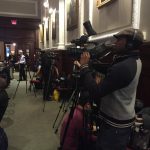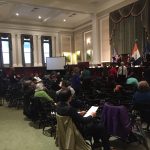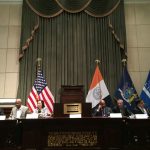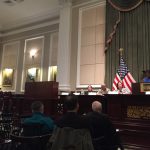On March 28, at the New York City Bar Association, a forum was held to discuss race relations and collaboration between Asian American and African American communities after the Peter Liang case. The event was organized by Asian American Business Development Center and One Hundred Black Men. It was co-sponsored by the Asian American Bar Association of New York, the Metropolitan Black Bar Association, New York City Bar’s Committee to Enhance Diversity in the Profession and New York City Bar’s Committee on Minorities in the Profession.
L. Joy Williams of New York-based consulting firm LJW Strategies served as moderator. She introduced Michael Garner, President of One Hundred Black Men, and John Wang, President of the Asian American Business Development Center (AABCD), the co-organizers of the forum. Mr. Garner and Mr. Wang offered welcome remarks and both spoke about the urgent need for African American and Asian American communities to come together and engage in dialogue in the wake of the Peter Liang case.
The panel discussion began with Lumumba Akinwole-Bandele, Senior Community Organizer at the NAACP Legal Defense and Education Fund, and Sandra Leung, Board member at the Asian American Legal Defense and Education Fund and former prosecutor in the New York County District Attorney’s Office, speaking about different community reactions to the Peter Liang case.
Mr. Akinwole-Bandele recounted the long history of collaboration between Asian American and African American community activists on a wide range of social justice issues and urged that the communities continue to collaborate. He also spoke about the need for institutional reform and increased police accountability.
Ms. Leung acknowledged the division within the Asian American community over the Peter Liang case and expressed the hope that it will not lead to further divisions between Asian American and African American communities. She further expressed the view that the Peter Liang case raises issues of police accountability and lack of training. She shared the belief that having forums like the present one is a good step forward and dialogue between the communities needs to continue.
Next, New York State Assemblyman Ron Kim, from District 40 in Queens, and New York State Assemblyman Walter Mosley, from District 57 in Brooklyn, explored common issues facing the two communities.
Assemblyman Kim spoke about the importance of dispelling stereotypes of Asian Americans as being privileged foreigners. These misperceptions of the Asian American community are related to the Peter Liang case because they lead to mistreatment of and discrimination against Asians. Assemblyman Kim spoke forcefully about the community’s refusal to be scapegoated and to be subject to double standards. Assemblyman Kim’s full statement can be found on this blog at http://blog.aabany.org/post/142014820132/assemblyman-ron-kim-calls-for-unity-between-black
Assemblyman Mosley noted his close working relationship with Assemblyman Kim, in particular through Assemblyman Mosley’s role on the Black, Puerto Rican, Hispanic, and Asian Legislative Caucus. Assemblyman Kim sought advice from Assemblyman Mosley regarding the Peter Liang case, and he gladly offered it. Assemblyman Mosley looked forward to continuing the dialogue so that both communities can see what they have in common rather than moving in the direction of further division.
Finally, Peter Kwong, Distinguished Professor of Asian American Studies and Urban Affairs, Hunter College, and Rev. Jacques A. DeGraff, Minister of Social Justice at Canaan Baptist Church, spoke on common areas for future collaboration.
Prof. Kwong began by providing historical background and context, noting the large expansion of Chinese Americans in New York City over the last few decades, with a largely immigrant population that lacks knowledge of the history of the black civil rights movement and legacy of slavery.
Rev. DeGraff also noted that immigration has a new face, with increased arrivals from China and India, and that this fact has an impact on all our communities. Rev. DeGraff favored the creation of a high school leadership academy, to build lines of communication among young people. He also advocated for planting the seed in public policy of a curriculum on multi-cultural society and to teach and learn global history that is not Eurocentric.
Prof. Kwong agreed that more focus should be placed on the importance of ethnic studies, stating that history is not being taught. He has been fighting for and continues to fight for Asian American studies to be taught in schools.
A vigorous question-and-answer session followed, and Ms. Williams as moderator laid down some ground rules and managed to keep the questions on point, although some of the audience members were determined to express their comments, rules or no rules.
AABANY thanks AABCD and One Hundred Black Men for organizing a forum that is timely and critical. AABANY thanks MBBA, New York City Bar’s Committee to Enhance Diversity in the Profession and New York City Bar’s Committee on Minorities in the Profession for co-sponsoring.
AABANY believes that dialogue is necessary and desirable and will work to ensure that the conversation does not end with this forum. Stay tuned for more events to keep the discussion going. If you are interested in helping AABANY with this effort, contact main@aabany.org.





